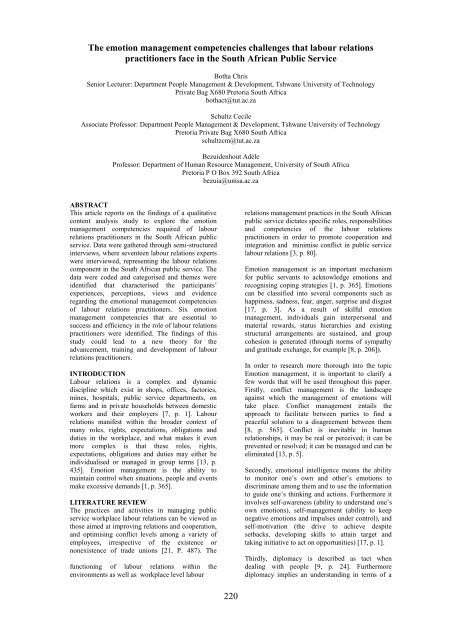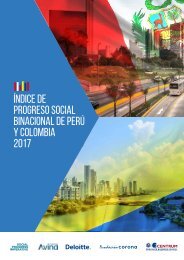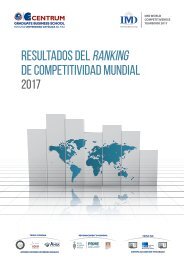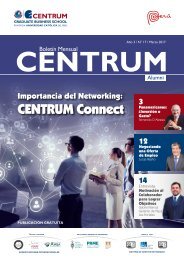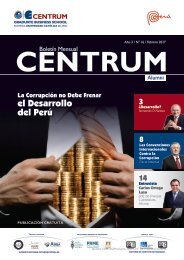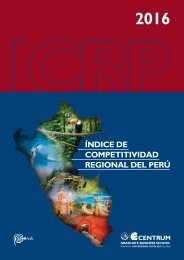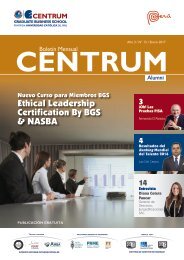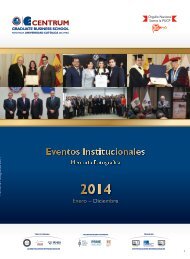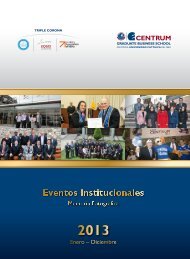Pan-Pacific Conference XXXIV. Designing New Business Models in Developing Economies
This publication represents the Proceedings of the 34th Annual Pan-Pacific Conference being held in Lima, Peru May 29-31, 2017. The Pan-Pacific Conference has served as an important forum for the exchange of ideas and information for promoting understanding and cooperation among the peoples of the world since 1984. Last year, we had a memorable conference in Miri, Malaysia, in cooperation with Curtin University Sarawak, under the theme of “Building a Smart Society through Innovation and Co-creation.” Professor Pauline Ho served as Chair of the Local Organizing Committee, with strong leadership support of Pro Vice-Chancellor Professor Jim Mienczakowski and Dean Jonathan Winterton.
This publication represents the Proceedings of the 34th Annual Pan-Pacific Conference being held in Lima, Peru May 29-31, 2017. The Pan-Pacific Conference has served as an important forum for the exchange of ideas and information for promoting understanding and cooperation among the peoples of the world since 1984. Last year, we had a memorable conference in Miri, Malaysia, in cooperation with Curtin University Sarawak, under the theme of “Building a Smart Society through Innovation and Co-creation.” Professor Pauline Ho served as Chair of the Local Organizing Committee, with strong leadership support of Pro Vice-Chancellor Professor Jim Mienczakowski and Dean Jonathan Winterton.
You also want an ePaper? Increase the reach of your titles
YUMPU automatically turns print PDFs into web optimized ePapers that Google loves.
The emotion management competencies challenges that labour relations<br />
practitioners face <strong>in</strong> the South African Public Service<br />
Botha Chris<br />
Senior Lecturer: Department People Management & Development, Tshwane University of Technology<br />
Private Bag X680 Pretoria South Africa<br />
bothact@tut.ac.za<br />
Schultz Cecile<br />
Associate Professor: Department People Management & Development, Tshwane University of Technology<br />
Pretoria Private Bag X680 South Africa<br />
schultzcm@tut.ac.za<br />
Bezuidenhout Adéle<br />
Professor: Department of Human Resource Management, University of South Africa<br />
Pretoria P O Box 392 South Africa<br />
bezuia@unisa.ac.za<br />
ABSTRACT<br />
This article reports on the f<strong>in</strong>d<strong>in</strong>gs of a qualitative<br />
content analysis study to explore the emotion<br />
management competencies required of labour<br />
relations practitioners <strong>in</strong> the South African public<br />
service. Data were gathered through semi-structured<br />
<strong>in</strong>terviews, where seventeen labour relations experts<br />
were <strong>in</strong>terviewed, represent<strong>in</strong>g the labour relations<br />
component <strong>in</strong> the South African public service. The<br />
data were coded and categorised and themes were<br />
identified that characterised the participants’<br />
experiences, perceptions, views and evidence<br />
regard<strong>in</strong>g the emotional management competencies<br />
of labour relations practitioners. Six emotion<br />
management competencies that are essential to<br />
success and efficiency <strong>in</strong> the role of labour relations<br />
practitioners were identified. The f<strong>in</strong>d<strong>in</strong>gs of this<br />
study could lead to a new theory for the<br />
advancement, tra<strong>in</strong><strong>in</strong>g and development of labour<br />
relations practitioners.<br />
INTRODUCTION<br />
Labour relations is a complex and dynamic<br />
discipl<strong>in</strong>e which exist <strong>in</strong> shops, offices, factories,<br />
m<strong>in</strong>es, hospitals, public service departments, on<br />
farms and <strong>in</strong> private households between domestic<br />
workers and their employers [7, p. 1]. Labour<br />
relations manifest with<strong>in</strong> the broader context of<br />
many roles, rights, expectations, obligations and<br />
duties <strong>in</strong> the workplace, and what makes it even<br />
more complex is that these roles, rights,<br />
expectations, obligations and duties may either be<br />
<strong>in</strong>dividualised or managed <strong>in</strong> group terms [13, p.<br />
435]. Emotion management is the ability to<br />
ma<strong>in</strong>ta<strong>in</strong> control when situations, people and events<br />
make excessive demands [1, p. 365].<br />
LITERATURE REVIEW<br />
The practices and activities <strong>in</strong> manag<strong>in</strong>g public<br />
service workplace labour relations can be viewed as<br />
those aimed at improv<strong>in</strong>g relations and cooperation,<br />
and optimis<strong>in</strong>g conflict levels among a variety of<br />
employees, irrespective of the existence or<br />
nonexistence of trade unions [21, P. 487). The<br />
function<strong>in</strong>g of labour relations with<strong>in</strong> the<br />
environments as well as workplace level labour<br />
relations management practices <strong>in</strong> the South African<br />
public service dictates specific roles, responsibilities<br />
and competencies of the labour relations<br />
practitioners <strong>in</strong> order to promote cooperation and<br />
<strong>in</strong>tegration and m<strong>in</strong>imise conflict <strong>in</strong> public service<br />
labour relations [3, p. 80].<br />
Emotion management is an important mechanism<br />
for public servants to acknowledge emotions and<br />
recognis<strong>in</strong>g cop<strong>in</strong>g strategies [1, p. 365]. Emotions<br />
can be classified <strong>in</strong>to several components such as<br />
happ<strong>in</strong>ess, sadness, fear, anger, surprise and disgust<br />
[17, p. 3]. As a result of skilful emotion<br />
management, <strong>in</strong>dividuals ga<strong>in</strong> <strong>in</strong>terpersonal and<br />
material rewards, status hierarchies and exist<strong>in</strong>g<br />
structural arrangements are susta<strong>in</strong>ed, and group<br />
cohesion is generated (through norms of sympathy<br />
and gratitude exchange, for example [8, p. 206]).<br />
In order to research more thorough <strong>in</strong>to the topic<br />
Emotion management, it is important to clarify a<br />
few words that will be used throughout this paper.<br />
Firstly, conflict management is the landscape<br />
aga<strong>in</strong>st which the management of emotions will<br />
take place. Conflict management entails the<br />
approach to facilitate between parties to f<strong>in</strong>d a<br />
peaceful solution to a disagreement between them<br />
[8, p. 565]. Conflict is <strong>in</strong>evitable <strong>in</strong> human<br />
relationships, it may be real or perceived; it can be<br />
prevented or resolved; it can be managed and can be<br />
elim<strong>in</strong>ated [13, p. 5].<br />
Secondly, emotional <strong>in</strong>telligence means the ability<br />
to monitor one’s own and other’s emotions to<br />
discrim<strong>in</strong>ate among them and to use the <strong>in</strong>formation<br />
to guide one’s th<strong>in</strong>k<strong>in</strong>g and actions. Furthermore it<br />
<strong>in</strong>volves self-awareness (ability to understand one’s<br />
own emotions), self-management (ability to keep<br />
negative emotions and impulses under control), and<br />
self-motivation (the drive to achieve despite<br />
setbacks, develop<strong>in</strong>g skills to atta<strong>in</strong> target and<br />
tak<strong>in</strong>g <strong>in</strong>itiative to act on opportunities) [17, p. 1].<br />
Thirdly, diplomacy is described as tact when<br />
deal<strong>in</strong>g with people [9, p. 24]. Furthermore<br />
diplomacy implies an understand<strong>in</strong>g <strong>in</strong> terms of a<br />
220


